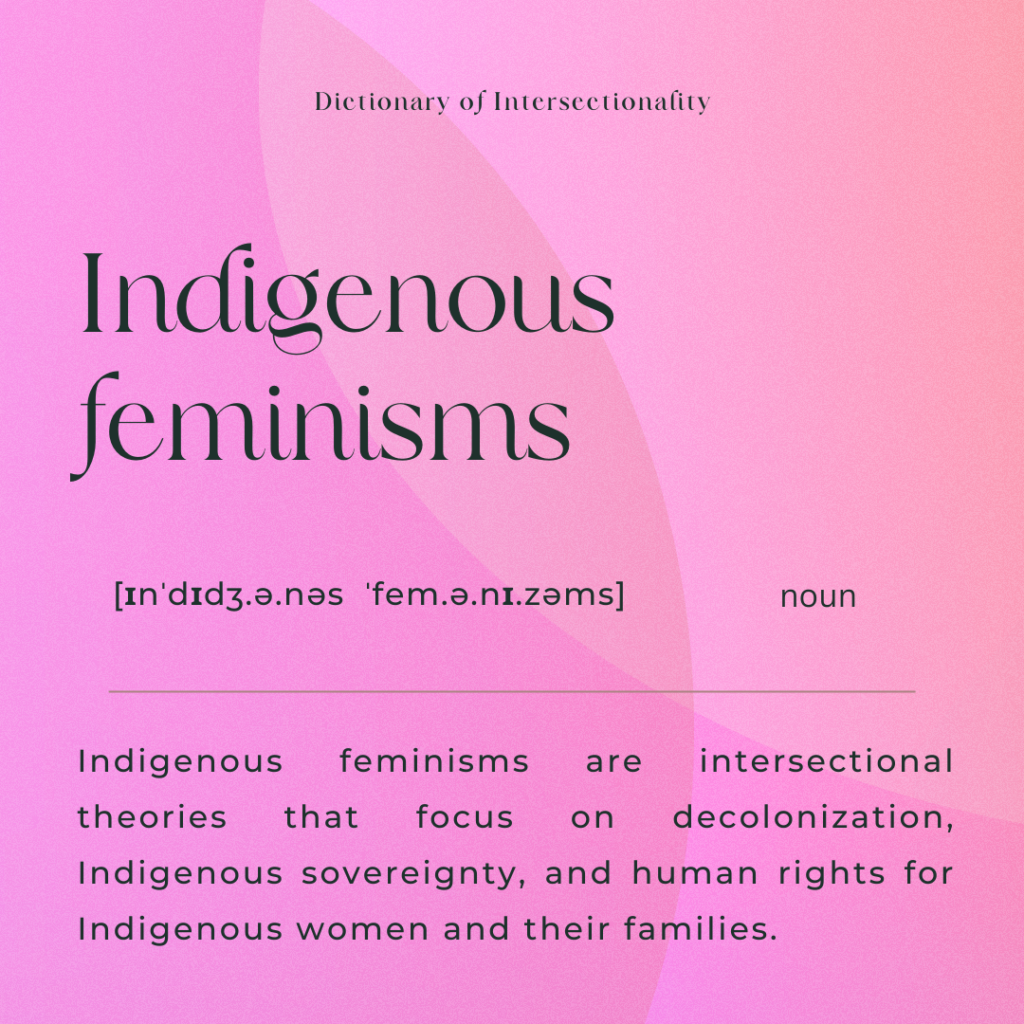
Indigenous feminism is an intersectional theory focusing on decolonization, Indigenous sovereignty, and human rights for Indigenous women and their families.
As a perspective for a world without colonialism and patriarchy, Indigenous feminism recognizes the intersections between colonialism and patriarchy and their impact on Indigenous communities. Unique key issues such as the disproportionate sexual abuse of Indigenous women and the epidemic of missing and murdered Indigenous women are complemented by their own responsibility to protect “Mother Earth” and their homeland.
Indigenous feminisms offer a lens that helps to understand the role settler colonialism plays in patriarchal systems of oppression, including violence, that draws on Indigenous knowledge and experiences. By ‘decolonization of the minds’, establishing traditional views of genders again, and upholding tribal sovereignty, Indigenous feminism aims for a society where all people of all genders are equally respected and valued.
Besides reclaiming and upholding traditional roles and responsibilities, decolonization, in general, requires the pursuit of fundamental rights. This reestablishing of old traditions and worldviews contains the untwisting of cultural roles from colonization and patriarchy. However, most native women traditionally enjoyed the same rights in their societies, where the contributions of all community members were considered important.
These feminisms remember and draw upon a history in which often matriarchal systems were practiced as essential aspects of Indigenous cultures – something mainstream feminism has not yet achieved. For this reason, the concept of Indigenous feminism is controversial among Indigenous women.
Originally the term feminism referred to white women fighting for social equity. According to Adrienne Keene, a well-respected Cherokee professor at Brown University and author of the Native Appropriations blog, mainstream feminism tends to focus on the idea that one’s identity as a woman is prioritized over other identities. In the domain of ethnic minority and feminist theory writing, Indigenous theorists are continuing to construct a political and social native feminist context to stop the institutionalization of gender and racially discriminatory policies.
Indigenous feminists acknowledge how our culture impacts our lives and thinking. Matriarchal, in that sense, does not mean power over men or others, but transformative power, which grows from respect for self and equality with others in all their diversity of identity, experience, and ability – the core of Indigenous feminisms.
See more resources
Retrieved on 18th of April, 2023 from https://givingcompass.org/article/what-is-indigenous-feminism
Retrieved on 18th of April, 2023 from https://ssir.org/articles/entry/indigenous_feminism_is_our_culture
Retrieved on 18th of April, 2023 from https://www.wernative.org/articles/indigenous-feminism
Retrieved on 18th of April, 2023 from https://ecommons.udayton.edu/cgi/viewcontent.cgi?article=2892&context=stander_posters
Retrieved on 18th of April, 2023 from https://www.beaconbroadside.com/broadside/2020/03/the-indigenous-roots-of-modern-feminism.html
Retrieved on 19th of April, 2023 from https://uw.pressbooks.pub/happy50thws/chapter/disrupting-systems-of-oppression-by-re-centering-indigenous-feminisms/
